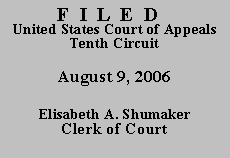

| UNITED STATES OF AMERICA,
Respondent-Appellee, |
|
| v. | |
| CESAR CONTRERAS-RAMOS, |
Bel-Ami De Montreux, Montreux Freres, P.C., Salt Lake City, Utah for Petitioner-Appellant
.Wayne T. Dance, Assistant United States Attorney, Office of the United States Attorney, Salt Lake City, Utah for Respondent-Appellee
.
A defendant's waiver of the right to appeal may itself be waived by the government. In United States v. Clark, 415 F.3d 1234 (10th Cir. 2005), this Court refused to enforce a defendant's waiver of the right to appeal because the government "neither filed a motion to enforce [the defendant's] plea agreement, nor argued in its brief that we should dismiss [the defendant's] appeal on the basis of her appellate rights waiver." Id. at 1238 n.1 (internal citation omitted). The preferred procedure for invocation of an appeal waiver is for the government to file a motion under Tenth Circuit Rule 27.2(A)(1), or to argue the waiver issue in its brief. But in United States v. Calderon, 428 F.3d 928, 930-31 (10th Cir. 2005), we observed that "the government is accorded flexibility in the form of its request for enforcement of an appeal waiver," and held that "the waiver is waived when the government utterly neglects to invoke the waiver in this court." Id. at 930-31.
In accordance with those precedents, we hold that where the government explicitly cites an appeal waiver in a letter to the Court in response to an Anders brief, the waiver is not waived and must be enforced if it meets the requirements of United States v. Hahn, 359 F.3d 1315, 1325 (10th Cir. 2004). In its letter to the Court declining to file a brief, the government explicitly stated that "this appeal is clearly barred by the appeal waiver signed by Contreras-Ramos as part of his plea agreement." R. Doc. 34 at 1. That is sufficient.
Because the government has successfully invoked its rights under the plea agreement, the waiver of appellate rights is enforceable if Mr. Contreras-Ramos knowingly and voluntarily agreed to the waiver. See United States v. Hernandez, 134 F.3d 1435, 1437 (10th Cir. 1998) ("A defendant's knowing and voluntary waiver of the statutory right to appeal his sentence is generally enforceable.") The Sentencing Hearing reflects that Mr. Contreras-Ramos understood that he had waived his right to appeal. His counsel stated, "My advice to him was that unless the court gave him a statutorily illegal sentence, that there would not be an appeal." App. 28-29. Neither counsel nor Mr. Contreras-Ramos has suggested that the waiver was not knowingly or voluntarily made. Therefore, Mr. Contreras-Ramos waived his right to appeal any issue within the scope of the waiver.
Mr. Contreras-Ramos's plea agreement allows him to appeal a sentence only under the following circumstances: (1) the sentence was imposed in violation of law; or (2) the sentence imposed was unreasonable in light of factors listed in 18 U.S.C. § 3553(a). The record demonstrates that the sentence imposed is lawful and reasonable. Mr. Contreras-Ramos's Presentence Report established an offense level of 27 and a guideline range of 70 to 87 months. His sentence was 70 months, at the low end of the range and not in excess of the statutory maximum. This sentence is presumptively reasonable because it falls within the guidelines range, see United States v. Kristl, 437 F.3d 1050, 1053 (10th Cir. 2006), and Mr. Contreras-Ramos has presented no reason why the district court should have departed from the guidelines. Because there is no indication that the sentence was unlawful or unreasonable, Mr. Contreras-Ramos waived the right to appeal his sentence.
Accordingly, we DISMISS the appeal and GRANT counsel's motion to withdraw.
*.After examining the brief and appellate record, this panel has determined unanimously to honor the parties' request for a decision on the briefs without oral argument. See Fed. R. App. P. 34(a)(2); 10th Cir. R. 34.1(G). The case is therefore submitted without oral argument.